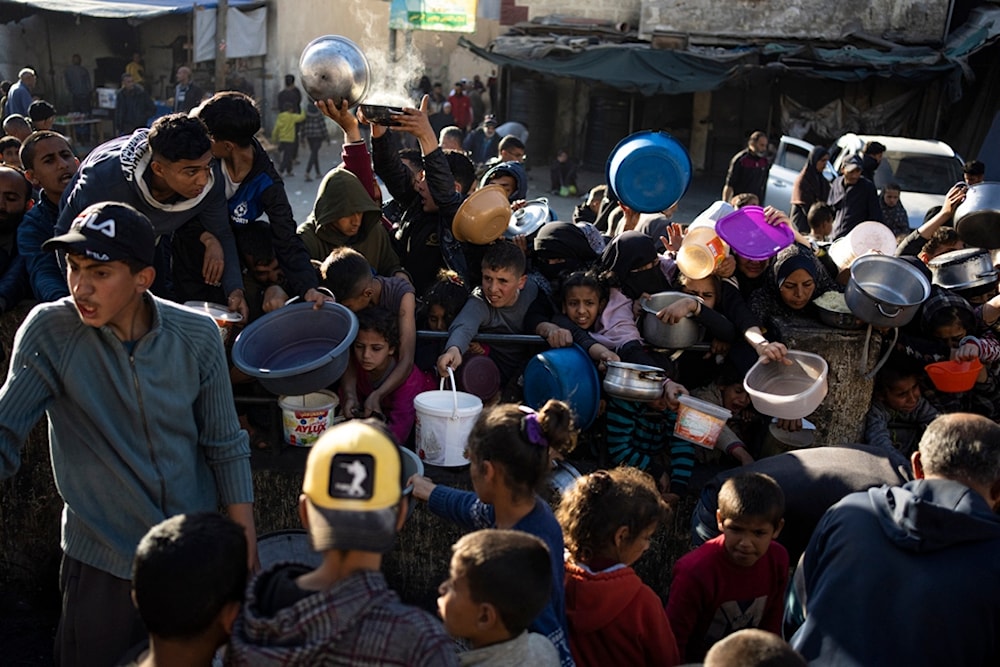Gaza Port: A complex solution to a direct problem - Washington Post
This WP analysis details how the US would rather starve Palestinians for two more months instead of forcing "Israel" to open humanitarian corridors.
-

Palestinians line up for a free meal in Rafah, Gaza Strip, on Tuesday, March 12, 2024. (AP)
The Washington Post featured an analysis of what prompted the United States to build a port on the Gazan shores under the guise of delivering relief aid.
Sammy Westfall, the author, cites Michael E. Ruane's comparison of the Gaza port and the Mulberry harbors, two fabricated stops through which thousands of weapons were smuggled to Allies' troops while all other roads were shut.
However, the comparison encompasses one striking difference: Gaza sits at the center of routes that could transfer and deliver aid if "Israel" did not control them, or prohibited the passage of aid.
The port is said to need two months of construction, and around 1,000 troops for supervision and completion amid a rapidly increasing humanitarian crisis that experts and relief organizations have been warning would indefinitely transcend into a full-scale, Gaza-wide famine.
It is then highlighted that the US is resorting to extreme, time-consuming solutions, to a fairly direct problem: Opening humanitarian corridors to Gaza.
'Israel' randomly rejecting aid to Gaza
The problem itself is created because "Israel" actively and deliberately blocks humanitarian aid from reaching Gaza. Amid growing demands for aid to be rushed and allowed into Gaza, "Israel" inspects aid and rejects it randomly, Westfall said, citing reports by Save the Children, and notes that "Israeli restrictions had “obstructed humanitarian action at every step of the aid delivery process."
She adds that it is not only the random and inadequate inspection of aid that disallows it from entering Gaza, but also the arbitrary denials and intentional targeting of humanitarian infrastructure that ultimately impedes all aid deliveries into Gaza, creating the Israeli manmade humanitarian crisis.
Amid the famine, Biden calls for the relaxation of Israeli restrictions but opts to resort to complicated measures, neglecting the 'diplomatic leverage' facet of the issue, and creating more political problems instead.
In February, 20 food trucks entered Gaza over seven days. Before "Israel" launched its onslaught and genocide on October 7, 500 trucks entered Gaza daily. Westfall then cites experts from humanitarian organizations that revealed it has been more and more difficult to get aid into Gaza, than it has been to do so in Yemen and Syria. This represents "the impediments in place that are restricting and straining the scaling of the humanitarian operation,” according to Jesse Marks, a senior advocate for the Middle East for Refugees International.
Marks then says the port's construction and the airdropping of aid signify the US' exasperation with solutions amid the impossibility of opening and securing relief routes. However, the people of Gaza cannot wait two months, they are starving now, she adds.
ReliefWeb revealed that if five trucks were to enter Gaza, that is over 100 tonnes of food that could mitigate the impending famine.
Read more: 'Israel' main disruptor of US maritime aid delivery plan: The Guardian
'The United States' Ineffectiveness'
Critics of "Israel's" restrictions, policies, and determination to collectively punish Gaza note that it is "crazy" to resort to such methods when aid trucks sit at Gaza's borders, unable to move because "Israel" would not allow them to.
Michael Fakhri, the U.N. special rapporteur on the right to food, slammed the pier plan as an "insulting performance, and nobody is fooled".
He goes on to critique the charade and says the US is building this pier to show the world that it is doing something, and highlights that it could instead pressure "Israel" with the insurmountable weapon and military aid it is providing the occupation with, in return for sending humanitarian aid to Gaza.
According to The Economist, Biden refuses to utilize America's clout to push "Israel" to let additional supplies into Gaza. Now, after enabling "Israel's" behavior for months, he is seeking ways to free it of accountability.
The UN Relief and Works Agency is also concerned with the distribution of help once it arrives on the ground. Chris Doyle, executive director of the Council for Arab-British Understanding, believes the decision of the US to airdrop aid is a sign of "America's ineffectiveness".
Doyle notes that airdrops are considered dangerous and not enough, emphasizing that the US is only doing so since it "cannot persuade Israel to allow aid into Gaza by land and in trucks. It is the ultimate sign of weakness and shows the US is unwilling to stand up to Israel.”
According to Politico, the airdrops expose Biden's very limited approach with "Israel" since the US usually delivers airdrops to areas that are occupied by "terrorist groups or hostile regimes, not allies."

 5 Min Read
5 Min Read








